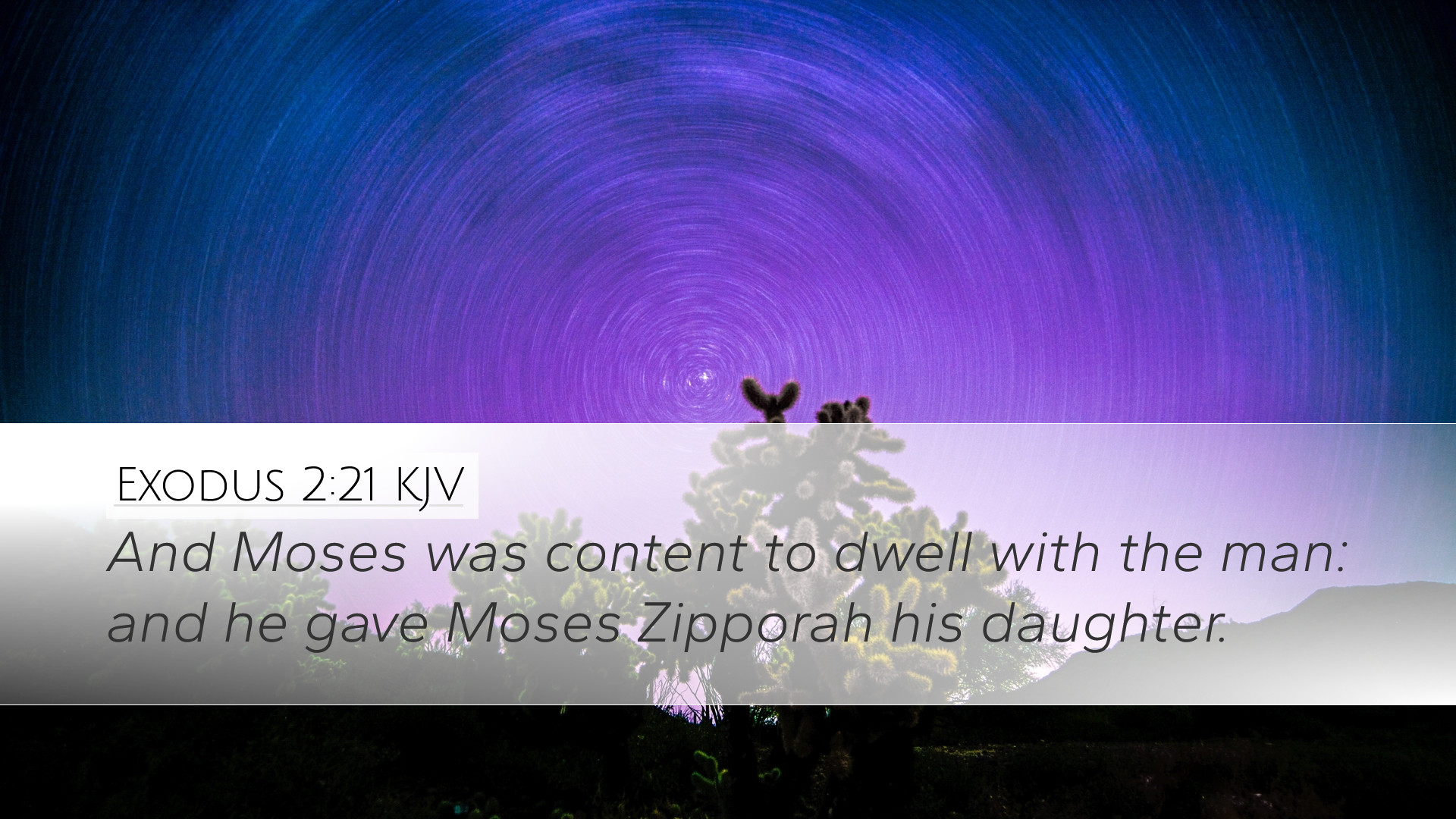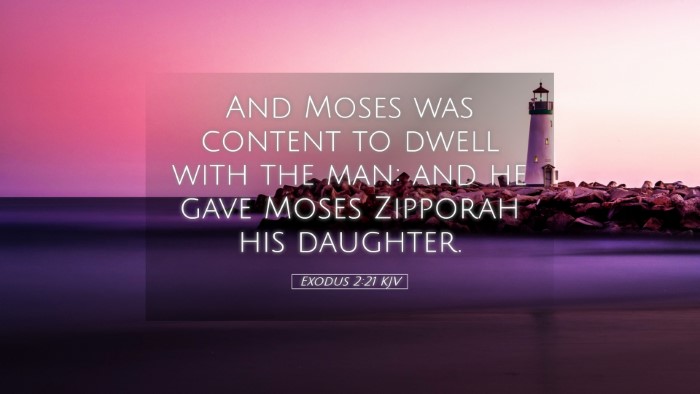Commentary on Exodus 2:21
Verse Reference: Exodus 2:21 - "And Moses was content to dwell with the man: and he gave Moses Zipporah his daughter to wife."
Introduction
The passage in Exodus 2:21 marks a significant transition in the life of Moses. After fleeing from Egypt, having killed an Egyptian, Moses finds refuge in Midian. This verse encapsulates his new beginnings, where he trades his status as a prince for the humble role of a shepherd and eventually becomes part of a new family. The implications of this moment extend beyond personal transformation, reflecting broader themes of providence, identity, and God's redemptive plan.
Theological Insights
1. God's Providence in Human Affairs
Matthew Henry emphasizes the significance of God's providential guidance in the lives of His chosen instruments. Moses' move to Midian was not merely a happenstance; it was the Lord’s orchestrating of events to prepare Moses for his future role as the deliverer of Israel. This perspective highlights how God’s hand is consistently at work in the mundane aspects of our lives.
2. Contentment in Displacement
Albert Barnes draws attention to the notion of Moses being "content" in his new circumstances. This contentment serves as a powerful reminder for believers facing transitions or trials. It exemplifies a reliance on God’s provision in unfamiliar territories. For pastors and theologians, it serves as a poignant reflection on finding peace and satisfaction in God's timing, even amid uncertainty.
3. The Role of Family and Community
Adam Clarke addresses the familial aspect of this verse, noting that Moses marrying Zipporah is indicative of the importance of community and relationships in the life of an individual. Family ties often provide the support and stability needed during transitional periods. Therefore, this verse can encourage church leaders to foster strong community ties that nurture spiritual growth and foster a sense of belonging.
Character Study: Moses
This verse invites readers to reflect on the character and development of Moses. Initially raised in the palace of Pharaoh, he is now in a foreign land learning humility and dependence. The transformation from a figure of authority to that of a shepherd underscores a theme of preparation through adversity.
Moses' Leadership Journey
Moses' time in Midian serves as a foundational period. Matthew Henry notes that this phase allowed him to grow as a leader. The experiences he gained during this period of "wilderness training" equipped him uniquely for leading the Israelites out of Egypt, teaching us that God often uses difficult circumstances to mold our character for His purposes.
The Marriage to Zipporah
The act of marrying Zipporah, as mentioned in Exodus 2:21, reflects Moses' integration into Midianite culture, further solidifying his new identity. Albert Barnes points out that this marriage is not just a union but a covenant that binds Moses to a new people and a new life, illustrating the connectivity of God’s plan across different cultures and peoples.
Broader Biblical Context
Understanding this verse requires not just a focus on Moses but also on the greater narrative of Israel's history. The deliverance of Israel is a central theme throughout Scripture. The development of Moses as a leader is essential for grasping the broader redemptive narrative.
Preparation for Deliverance
Adam Clarke notes that Moses' time in Midian was much more than a refuge; it was a time of divine preparation. The eventual emergence of Moses as the liberator of God’s people presents the tapestry of God's providential work — showing great detail and foresight as He works through human frailty and failure.
Application for Today’s Believers
This passage resonates with modern readers who may feel dislocated in their lives. There is a message of hope that God can, and often does, use our most challenging experiences to shape us into vessels for His work. Contentment in God's providential care is crucial in times of trial. Henry and Barnes both encourage believers to recognize God's presence in their transitions.
Conclusion
Exodus 2:21 serves as an essential verse for understanding the life of Moses, the nature of divine providence, and the importance of our responses to life's changes. As pastors, students, and theologians delve deeply into this passage, they are invited to explore the richness of God’s unfolding story through Moses’ life, encouraging a vibrant application of these truths in their communities and personal lives.
Final Reflection
Ultimately, the life of Moses teaches us that through faithfulness in small beginnings and a willingness to embrace God's plans, we align ourselves with His redemptive purposes. The journey of faith often leads us to unexpected places, but within these transitions lies the promise of growth and transformation.


